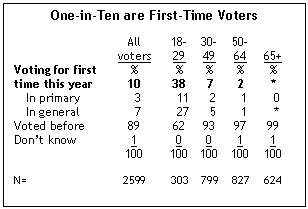 One-in-ten voters say that 2008 is the first year in which they will have voted. This includes 3% who say they voted for the first time this primary season, and another 7% who say the general election will be their first vote. This election cycle is the first time voting for nearly four-in-ten (38%) voters ages 18-29.
One-in-ten voters say that 2008 is the first year in which they will have voted. This includes 3% who say they voted for the first time this primary season, and another 7% who say the general election will be their first vote. This election cycle is the first time voting for nearly four-in-ten (38%) voters ages 18-29.
Not only are first-time voters much younger than the electorate overall (fully 70% of first time voters are younger than 30), but they also include a lower percentage of Republicans than the overall electorate. Just 21% of first-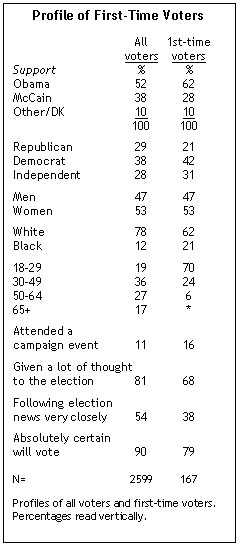 time voters are Republicans, compared to 29% of all voters.
time voters are Republicans, compared to 29% of all voters.
And while African Americans represent 12% of registered voters nationwide, fully 21% of first time voters are black.
Overall, people who are voting for the first time this year favor Obama over McCain by more than two-to-one (62% vs. 28%).
When it comes to interest in the election and certainty of voting, first-time voters lag behind all voters on several key measures. While first-timers are at least as likely to have attended a campaign event this cycle (16% compared with 11% of voters overall), they are 13 points less likely than all voters to have given a lot of thought to the election (68% vs. 81% overall). They also are far less likely to be following election news very closely (38% vs. 54% overall) and to be absolutely certain that they will vote in this election (79% vs. 90% of registered voters overall.)
Early Voters
While most registered voters (66%) say they plan to cast their ballot on Election Day, roughly three-in-ten (31%) say that they plan to vote before Election Day, including 7% who say they already have cast a ballot in the presidential election. If these early voting rates prove to be accurate, it represents a substantial rise from 20% in 2004 and 14% in 2000, according to figures from the Early Voting Information Center.
Barack Obama’s lead is wider among the 31% who either have already voted or plan to vote early. He holds a 25-point lead over McCain (59% to 34%) among early voters, compared with an 11-point lead (51% to 40%) among those who intend to vote on Election Day. A large share of early voters affiliate with the Democratic Party this year (41% vs. 27% for Republicans).
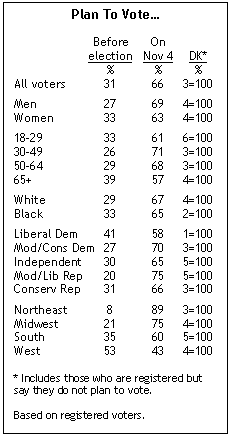 This stands in contrast to findings from the 2004 National Election Pool exit polls, which included a telephone sample of Americans who reported having voted early or by absentee ballot. These voters favored Bush over Kerry by a 50% to 48% margin, virtually identical to the vote among those who cast their ballots at their polling place (51% to 48%).
This stands in contrast to findings from the 2004 National Election Pool exit polls, which included a telephone sample of Americans who reported having voted early or by absentee ballot. These voters favored Bush over Kerry by a 50% to 48% margin, virtually identical to the vote among those who cast their ballots at their polling place (51% to 48%).
A 53% majority of voters living in the West say they will cast their ballot before Nov. 4, as do 35% of those living in the South and 21% in the Midwest. Just 8% living in the Northeast say they will vote early, while 89% will vote on Election Day.
Liberal Democrats are the most likely partisan group to say they will vote early – 41% will do so compared with 31% of conservative Republicans. Nearly four-in-ten (39%) voters 65 and older say they either have already voted or plan to cast their ballot before Election Day.
Voters Engaged in 2008 Campaign
More than eight-in-ten voters (81%) have given a lot of thought to the coming presidential election, which is among the highest levels of consideration recorded by Pew surveys since the question was first asked in 1992. Voters have shown record high levels of engagement in this election throughout the year. The percentage of voters giving a lot of thought to the election has been over 70% since late winter; in past election cycles the share of voters giving a lot of thought to the election often hovered at around 60% until the final months of the campaign.
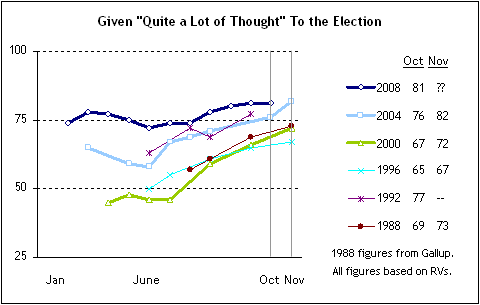
The high levels of engagement are shared across party lines. An identical 82% of Republicans and Democrats have thought a lot about the presidential race, as have 79% of independents. This is comparable to 2004, when partisan groups were about equally engaged in the race. However, in earlier elections, such as 2000 and 1996, Democrats and independents generally lagged behind Republicans in the amount of thought given to the election; in 2000, 67% of Democrats and 64% of independents had thought a lot about the race in October, far fewer than the 77% of Republicans who had done so.
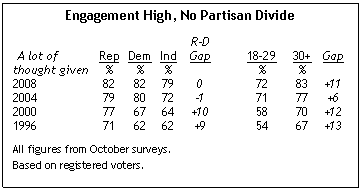 Younger voters are less likely than their elders to say they have given a lot of thought to the election. About seven-in-ten (72%) voters under age 30 say they have given quite a lot of thought to the election, compared with 83% of those age 30 and older. The share of 18-29 year olds who have given a lot of thought to the election today (72%) is almost identical to where it was at this point four years ago (71%). Meanwhile, the share of voters age 30 and over who have given a lot of thought to the campaign is up from 77% to 83%.
Younger voters are less likely than their elders to say they have given a lot of thought to the election. About seven-in-ten (72%) voters under age 30 say they have given quite a lot of thought to the election, compared with 83% of those age 30 and older. The share of 18-29 year olds who have given a lot of thought to the election today (72%) is almost identical to where it was at this point four years ago (71%). Meanwhile, the share of voters age 30 and over who have given a lot of thought to the campaign is up from 77% to 83%.
Barely Half of Swing Voters Say it Matters Who Wins
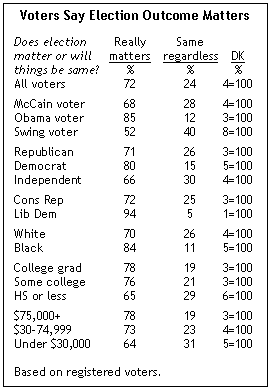 Fully 72% say that when it comes to making progress on the important issues facing the country, it really matters who wins the election. Just under a quarter (24%) say that things will be pretty much the same regardless of who is elected president. Democrats are more likely than Republicans and independents to say the winner of this election matters; fully 94% of liberal Democrats feel this way, compared with 72% of conservative Republicans. Swing voters are more ambivalent, with 52% saying the outcome matters and 40% saying things will pretty much be the same regardless.
Fully 72% say that when it comes to making progress on the important issues facing the country, it really matters who wins the election. Just under a quarter (24%) say that things will be pretty much the same regardless of who is elected president. Democrats are more likely than Republicans and independents to say the winner of this election matters; fully 94% of liberal Democrats feel this way, compared with 72% of conservative Republicans. Swing voters are more ambivalent, with 52% saying the outcome matters and 40% saying things will pretty much be the same regardless.
Those with low levels of education and lower incomes are less likely than the more educated and affluent to say the election matters; 64% of those with family incomes of under $30,000 a year and 65% of those with no more than a high school degree say it matters who wins, compared with nearly eight-in-ten of those with a college degree or annual incomes of $75,000 or more (78% each).


